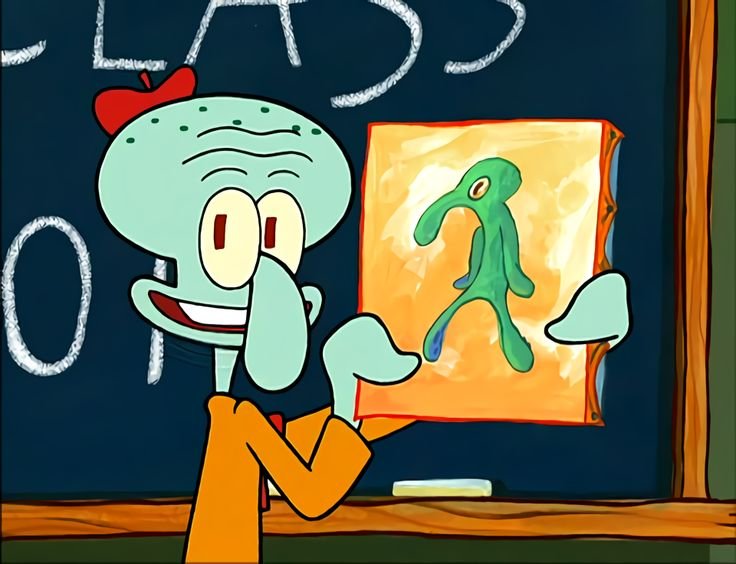Introduction to Squidward Tentacles
Squidward Tentacles is a character who has become synonymous with the globally popular animated series “SpongeBob SquarePants.” Created by marine biologist and animator Stephen Hillenburg, the show debuted in 1999 and has since become a cultural phenomenon. Squidward, the ever-grumpy, aspiring artist and musician, is one of the central characters, known for his sarcastic wit and perpetual annoyance at his neighbors, especially the titular character SpongeBob. This article delves into the story behind Squidward, exploring his character development, significance in the series, and the broader implications he holds in popular culture.
Character Design and Development
Squidward’s design is one of the most distinctive in modern animation. He is an anthropomorphic octopus with a large, bulbous head, a prominent nose, and a slender body. His color palette of various shades of blue complements his moody and sardonic personality. Squidward was designed by Hillenburg and was initially intended to be a more background character. However, as the series progressed, his role became more central, often serving as the straight man to SpongeBob’s more whimsical character. The development of Squidward’s character is a testament to the show’s evolving narrative style, where secondary characters have gained more depth and complexity over time.
Squidward’s Role in SpongeBob SquarePants
In the context of the show, Squidward works as a cashier at the Krusty Krab, a fast-food restaurant owned by Mr. Krabs. He is depicted as the quintessential underachiever, often expressing dissatisfaction with his job and life in general. Despite his grumpiness and seeming disdain for his neighbors, particularly SpongeBob and Patrick, Squidward has moments where he shows a softer, more caring side. This dichotomy adds layers to his character, making him relatable and multifaceted. Squidward’s interactions with other characters often highlight themes of tolerance, diversity, and the challenges of everyday life.
The Cultural Significance of Squidward
Squidward has transcended the boundaries of mere animated character status to become an icon in popular culture. He is often cited as a relatable figure for adults, especially those who find themselves navigating the complexities of modern life. His character resonates with many who feel stuck in unfulfilling jobs or who aspire to greater artistic or personal achievements. Squidward’s appeal lies in his very human frustrations and aspirations, which are depicted in a humorous, yet often poignant manner. The character has been the subject of various academic analyses, discussing themes ranging from existentialism to workplace dynamics.
Squidward’s Influence in Art and Music
As an aspiring artist and musician, Squidward’s pursuits in the arts are a significant aspect of his character. He plays the clarinet and often engages in different forms of visual art, albeit with varying degrees of success. His artistic endeavors reflect the show’s broader themes of creativity and the pursuit of personal passions, regardless of the recognition or success one might achieve. Squidward’s character inspires viewers to pursue their own artistic and creative interests, underscoring the importance of art and music in personal expression and fulfillment.
Squidward and Mental Health Representation
Squidward’s character has inadvertently become a symbol for discussions around mental health, particularly concerning issues like job dissatisfaction, burnout, and the pursuit of happiness. His often gloomy demeanor and outlook on life provide a platform for considering the importance of mental health and well-being. While the show itself does not explicitly address these topics, Squidward’s character offers a lens through which to explore them, making him an unexpectedly relevant figure in discussions about mental health awareness and the challenges of adulthood.
Squidward’s Impact on Memes and Internet Culture
In the digital age, Squidward has found a new life as a meme. Images of Squidward, often capturing his most sardonic or despondent expressions, are widely used on social media to convey feelings of annoyance, disillusionment, or existential dread. This phenomenon highlights the character’s adaptability and relevance to contemporary issues and sentiments. The memeification of Squidward demonstrates how a character from a children’s cartoon can resonate with a broader, more mature audience, reflecting the universal themes present in “SpongeBob SquarePants.”
Conclusion: Squidward’s Enduring Legacy
in conclusion, Squidward Tentacles is more than just a cartoon character; he is a cultural icon that represents a wide range of human emotions and experiences. From his humble beginnings as a secondary character in “SpongeBob SquarePants,” Squidward has grown into a symbol of the modern human condition, embodying the struggles, aspirations, and complexities of everyday life. His impact on popular culture, art, music, mental health discourse, and internet memes secures his place as an enduring




